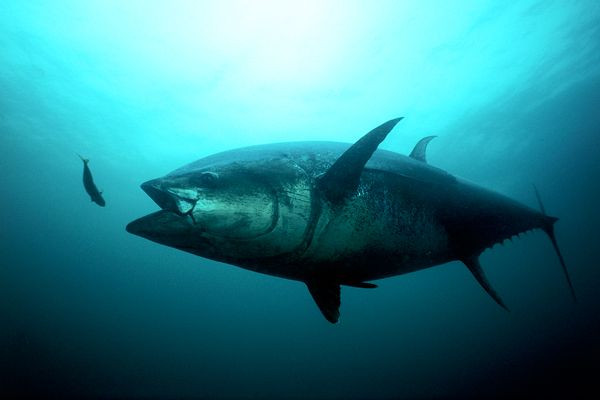Oil Pollution Hurts Tuna Hearts, Crude Oil ‘Blocked Key Processes’ In Fish’s Cardiac Cells

The effects of the 2010 Deepwater Horizon oil spill in the Gulf of Mexico are still being felt.
A new study published in the journal Science has found that crude oil interferes with the ability of fish heart cells to beat effectively. The research, which was conducted on the tuna population, found that the mixture of chemicals found in the oil slows the fish’s heart rates, reduces cardiac contractility and causes irregular heartbeats.
"The ability of a heart cell to beat," Barbara Block, a professor of marine sciences at Stanford University, said in a statement, "depends on its capacity to move essential ions like potassium and calcium into and out of the cells quickly. This dynamic process, which is common to all vertebrates, is called 'excitation-contraction coupling.' We have discovered that crude oil interferes with this vital signaling process essential for our heart cells to function properly."
While the harsh effects of crude oil on the developing hearts of fish embryos and larvae have been studied over the past two decades, the latest study is one of the first to describe the precise mechanisms involved.
Scientists studied tuna heart tissues in labs and found that polyaromatic hydrocarbons (PAHs) -- a chemical found in crude oil -- can block important cellular pathways. The tissue was taken from the hearts of wild bluefin tuna and yellowfin tuna that have been held captive at the Tuna Research Conservation Center in Pacific Grove, Calif., and at the nearby Monterey Bay Aquarium. Researchers soaked the cells in low doses of crude oil to simulate what fish in the Gulf of Mexico were exposed to.
“What we found was that oil blocked key processes in the cardiac cells involved with linking excitation to contraction, which means that beat to beat, we slowed the heart cells down and we also decreased their contractility,” Block told BBC.
The particular pathways involved are those that allow potassium and calcium to move in and out of cells. Both elements play a vital role in how heart cells function. And the presence of crude oil doesn’t have to be major. Scientists found crude oil in low concentrations can disrupt the pathways.
“At relatively higher concentrations, the effects on a developing fish heart are severe in that the heart muscle cannot do its job, or becomes deformed -- those fish will die,” study co-author Nathaniel Scholz told the Los Angeles Times. “As for exposure to lower concentrations, these fish will survive in clean water. But when we look at them later in life, we find they have changes in the shapes of their hearts, with corresponding impacts on their ability to swim.”
While the study focused on PAH levels in water, the findings also call attention to exposure of the chemical in air pollution.
"The protein ion channels we observe in the tuna heart cells are similar to what we would find in any vertebrate heart and provide evidence as to how petroleum products may be negatively impacting cardiac function in a wide variety of animals,” Block said. “This raises the possibility that exposure to environmental PAHs in many animals -- including humans -- could lead to cardiac arrhythmias and bradycardia, or slowing of the heart."
The Deepwater Horizon disaster spilled more than 4 million barrels of crude oil into the Gulf of Mexico at the same time Atlantic bluefin tuna were spawning, in the spring. Electronic tagging on the fish at the time confirmed their location and the premise that their eggs and larvae were exposed to the oil. In 2012, an estimated 36 percent of the 1970 baseline population was found surviving in the Gulf of Mexico.
© Copyright IBTimes 2024. All rights reserved.






















